| |
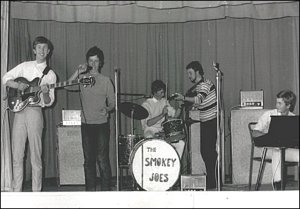
Thanks to drummer Gavin Carter here is the story of Smokey Joes
BEGINNINGS
Four of us had lived in Portscatho, a tiny village by the sea on the beautiful Roseland Peninsula. Following the war, a relatively large number of kids grew up together here. In the early sixties, before we were eighteen, we hung out in the Social Club "Coffee Bar". There was a record player behind the counter and, more often than not, so too was Keith "Cuthbert" Brown. It was a lively place, decorated with assorted pictures, posters and a bizarre collection of lavatory chains. The fifth member of the group came from "down West"; he was John "Dillon" Holdsworth, who soon became part of village life. It was the early to mid-sixties. The music scene was about to take off. We wanted to be part of it.
INFLUENCES
In the Coffee Bar, we listened to blues on vinyl records, from original, black artists from the Deep South Mississippi Delta, USA. In what seemed no time at all, we were soon listening to rhythm and blues recorded by rapidly emerging British groups playing music that owed its origin to these and other early black musicians such as Howlin' Wolf, Leadbelly and Muddy Waters.
Next came Tamla Motown and Soul. Right on. Many nights, finding it hard to concentrate on homework, I would go to the Club. There I met up with John "Psychic" Sykes, constantly playing the piano on the stage, fortified by Woodbines and Galaxy chocolate. To accompany him, I slapped the back of a stringless acoustic guitar left lying about. We jammed regularly for hours and hours, and I still like to think we forged a good musical rapport in this way. Occasionally, Club Stewards Hartley Pascoe and Ron Tiddy looked in, gave a wry smile, flicked "V" signs at us, gurned humorously, and went back to the fruit machines.
Cuthbert encouraged the five of us to get together and get on with it. Off to the Portscatho Memorial Hall we went, and started our search for equipment. It was late 1964. We bought 100 watt Linear Concorde amplifiers and began constructing speaker cabinets. I bought a Salvation Army bass drum and a snare drum for £2.10s. I also bought a couple of tom-toms in Plymouth, using group funds.
Next came a piece of good luck; a case of being in the right place at the right time. Cuthbert arranged for groups to play at the Portscatho Memorial Hall Youth Club. One such band was the Coronado Four, followed by another called The Dissatisfied. Both bands were truly inspirational to us. The Dissatisfied's lead guitarist and founder member was Jim Cregan. Thereafter, and right up to the present time, he pursued an illustrious career, collaborating throughout with a multitude of musical luminaries. For example, in 1977 he joined Rod Stewart's band and became Stewart's musical director, co-producer and co-writer - a position he held for many highly productive years.
Further on still, Cuthbert arranged for The Birds to play at St Austell Church Hall. We went to see them, of course, and they stayed at our house in Portscatho. The group then comprised Ali Mackenzie (Lead Singer), the late Kim Gardner (Bassist), Tony Munroe (Guitarist), Pete Hocking (Drums), and Ronnie Wood (Guitarist). I have never forgotten this gig, when their playing sent tingles down my spine. Goodness knows what some of the females that I knew in the audience were going through. Around this time Rob Curtis had the privilege of being shown harmonica techniques, such as note bending, by Ronnie Wood.
It is very enjoyable to Google their names on the internet, to see just how far they took their musical careers. They were young lads then, but we all knew how good they were. Their example taught us to aim high.
I must mention the stunning contribution made by drummer Pete Hocking (McDaniels) at this time. For me, he took rock drumming to a totally different level than I had seen before. I was mesmerised by his performances. Later, I had the less comfortable pleasure of following on after him at the Winter Gardens, Penzance, though he did encourage me on that night. Recently I had an enjoyable chance meeting with Derek Collins at Chris Pollard's 60th birthday party. Derek is another Portscatho lad, and also a regular and amusing presenter for Radio St Austell Bay. He reminded me about an endearing characteristic of Pete Hocking. When drumming, and concentrating hard, Pete used to habitually stick his tongue out of the side of his mouth. Derek observed that I used to do the same thing then (and I still do!) Maybe this was a subconscious attempt to copy his drumming style. My drumming may fall short of his, but at least I can stick my tongue out equally well!
(Incidentally, I would like to know what happened to Pete Hocking after the Birds disbanded, if anyone out there can shed some light on this.)
 
 
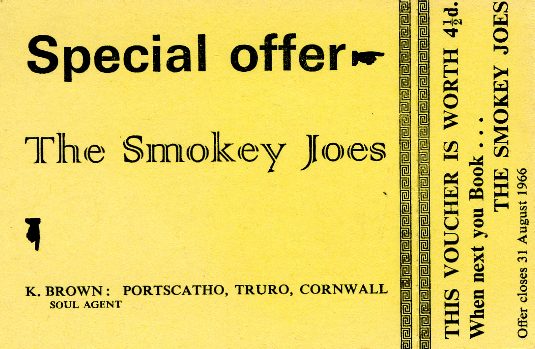 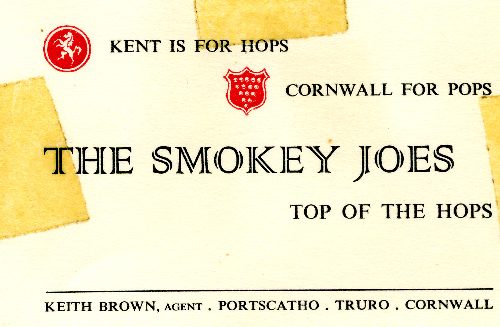
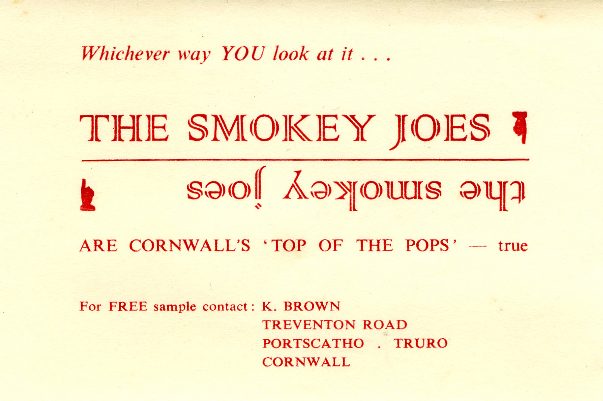
THE PORTSCATHO MEMORIAL HALL
From the very start, the Hall was of great help to us.
Bill's father, Cyril Harris, was the Hall caretaker. He cleaned the building on Saturday afternoons, and so we rehearsed at this time. Subsequently, Cyril carried out doorman duties for us and never missed a home gig. Furthermore, he kept an eye on our equipment, which we left there.
An added bonus was that the Hall had become the village cinema. The cinema equipment and a load of spare films had been taken up from the Club, which had performed this function in the past. This was an opportunity too good to miss. Later, when we played home gigs, we projected films such as Charlie Chaplin and cartoons onto a backdrop behind us while we were playing. The local Dramatic Society were also based at the Hall, with their lighting fixtures. So we were able to experiment and add a new dimension to our performances on two fronts.
The most beneficial aspect of the Hall, however, was that we were able to run our own gigs for our own benefit there. The profit from these gigs helped us to more rapidly upgrade our equipment than otherwise would have been possible. At this time, way before the advent of cheap, international flights, Portscatho and other places like it, was absolutely buzzing, and not just in summer. It became a magnet for young people living a carefree lifestyle, many camping out in "Arthur's Field".
However, on the flipside, mainly due perhaps to a comparatively minimal police presence, gigs at the Memorial Hall attracted the attention of rival gangs from Truro, Falmouth and St Austell. There was trouble and there were punch-ups. We had the good sense to employ Pete Coad as a bouncer at two pounds per night. Pete, an ex Royal Marine, identified particular problems and then sorted them out speedily, with a minimum of fuss.
Financial records covering the period show that there were regularly more than 175 people at these gigs, not bad for a tiny village.
GIGGING
A summary of the gigs we played appears below, but I may have missed some. Our first gig was on 2.1.1965, supporting The Big Four (Manny Cockell), and we played for half an hour. Our first number was "Nursery Rhymes" (Bo Diddley) and we walked on one at a time at the suggestion of John Harding, a regular visitor. After that performance, we paid for a teaching session with Pete Bawden of The Big Four, down at the Club. We had been playing together for a couple of weeks.
Now I can wholeheartedly acknowledge Cuthbert's role as manager and gig arranger in the development of the group. He became highly active and successful in obtaining away gigs straight away. I appreciate this far more today. His pursuit of the person who organised the gigs at the Coliseum, Carlyon Bay, deserves special mention. Her name was Mrs Smith, of Ranelagh Road, St Austell. It really was great fun to play at the Coliseum, supporting popular groups of the day. Audiences were large, and these gigs rapidly got our name about. Gigs came thick and fast. Within six months, we were well and truly on the circuit, playing other hot spots as a consequence.
When the band split up, Cuthbert continued to arrange musical events, culminating in one at the City Hall, Truro, in 1967. He booked Jeff Beck, featuring Rod Stewart, with Ronnie Wood on bass. He retains an interest today by booking a band or two for the popular annual Portscatho Regatta.
A major gig for us all was on 9.12.1965, when we supported The Who at Plymouth Guildhall. I could not wait to meet Keith Moon, but unfortunately he did not play. His place was taken by Viv Prince (Pretty Things), who kindly let me use his drums. It was good to talk to them all, backstage.

Our most surreal gig happened over the Christmas period, 1965, when we were booked to play at the Ship and Castle, St Mawes, for three consecutive days. By now, we had grown somewhat in confidence, and liked to "give it some". However, to our surprise we were asked to play to a seated audience engaged in pleasant conversation in the full restaurant.. Judith Chalmers was amongst the diners. We gave it a go. I used brushes. We played "Sweet Mary" and "Bye Bye Bird", but within less than 20 minutes we ground to a halt. We apologised and left. The hotel graciously paid half our agreed wages for the whole three day gig.
Following a couple more gigs, the group unexpectedly imploded over night. John Sykes decided to quit, much to my surprise and disappointment. For me, this was far from being a neat change. I was aware there was some friction developing within the group, but considered this development was an inevitable consequence of playing in an active outfit. Some of the group went to see The Birds play at Weymouth. This was an outing in a taxi, paid for with group funds to boost morale. We discussed our future musical direction together and asked Cuthbert to advertise for a lead guitarist. I presumed "Psychic" wanted to push ahead in London, where in truth, it was all happening.
PLAYING STYLE
Undoubtedly we were positively influenced by our friendly associations with the previously mentioned bands that had regularly come and stayed in Portscatho. We covered Birds' numbers such as "Leaving Here", "Next in Line", and "You're on My Mind". In particular, we admired their distinctive, punchy, rhythm 'n blues style. They were clearly ahead of the game, and we attempted to emulate them - as best we could.
At this point, I must thank Chris Pollard for his generous comments made earlier. From where I sat, what may have jointly set us apart from other local bands at that time, and increased our appeal, was our carefully selected material and, more importantly, Rob's harmonica playing. I know the latter was liked by members of The Birds. In my view, he was a great front man, and in effect was also the band's lead instrument, as it has to be said we were never noted for lead guitar playing. Most of the time, this did not matter too much. I feel sure Dillon, up above, would not mind me saying that we all held our breath whenever he was called upon to play the completely isolated lead break in "Leaving Here". God bless him.
We covered Cyril Davis tracks such as "Country Line Special", "Preaching the Blues" and "Sweet Mary", together with "Bye Bye Bird" by Sonny Boy Williamson. When Psychic was with us on pianotron, we played numbers such as "Parchman Farm" (Mose Allison), "Green Onions" (Booker T), and "Crawling up a Hill" (John Mayall). He used plenty of reverb on Bo Diddley tracks, such as "Nursery Rhymes", "Pretty Thing", and "Can't Judge a Book". He kept his right knee well over to the right under his keyboard, which operated his volume control in order to crank it up to the max.
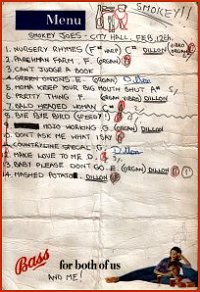
Typical setlist
We were joined in summer 1965 by Mitch "Sunshine" Fenner (Guitarist). He also played the saxophone - on "Rescue Me" (Fontella Bass) for example. He was a welcome addition to the group, and slotted in seamlessly for a limited period in high season 1965.
Following John Sykes's departure, Mick Grose joined us from St Austell, in response to our advertisement for a guitarist. Now we steered more towards Tamla Motown and Soul, playing tracks such as "Dancing in the Street", "Nowhere to Run", and "Heatwave" (Martha and the Vandellas), together with "Ain't that Peculiar" (Marvin Gaye). We never attempted to write any songs. Mick sang backing vocals, along with Bill and Dillon.
We had a deserved reputation for drinking at gigs, and I mention this only as a statement of fact. None of us had to drive. We consumed copious amounts of Newcastle Brown Ale, together with a bit of rum. For example, when buying six quarter bottles of rum for us all at an establishment in St Austell, the sales assistant said to Cuthbert, "I know where you lot come from." Clearly it did not help us at all technically, and was unprofessional. For instance, we arrived early for the group championship at Truro City Hall on 7.3.1966 and perhaps unwisely went down the pub. We were due to play the Princess Pavilion a couple of weeks later, but this was cancelled - our only ever cancellation - by one of the judges, who we met during the day. We still got a great reception from the audience. Our drinking may have energised our second set performances, even if they did not sound too good. We often concluded our gigs with "Hey Momma, Keep your Big Mouth Shut" (Bo Diddley), the song rising to a loud and extended crescendo. Rob was inclined to pour rum down my throat during this number, induce feedback, and ram his microphone frequently into my cymbals. Cuthbert looked on anxiously at this flirtation with Who-like antics, fearing this could become an expensive and therefore unwelcome development.
I am delighted to be able to show the accompanying film of the Smokey Joes in rehearsal at the Portscatho Memorial Hall. My girlfriend (now wife) does not seem too impressed with our efforts, since she can be seen reading the newspaper. This film has been successfully converted from cine to DVD by Alive Studios of Nottingham. I recently unearthed these rolls of film, which I feared had been lost inexplicably. It was my sister Celia who had the wisdom to capture these images, which prompted me to document the band's brief history on the Kernow Beat website.
Rehearsing 'Heatwave' and 'Going to a Go Go' at Portscatho Memorial Hall. 1966
MORSE'S COACHES
We invariably used Morse's Coaches for away gigs, to carry us and our equipment. Normally we were accompanied by a good crowd of people, who wanted to have fun. Managers of gig venues were pleased to see us arrive in good time - and all rush for the bar. When we resumed playing over the weekend of 25-27.2.1966, we all slept in the bus for two nights in the car park of the Westward Inn, Leigh Mill, where we were playing.
MORE GIGS
After our unplanned layoff, and with the arrival of Mick, we got right back into it. We played the Quay Club, Plymouth and, as mentioned earlier, competed in the group championship at Truro City Hall, which was won by The Reaction (Roger Taylor). Part of the prize for winning was being able to support Gerry and the Pacemakers at the Flamingo, Redruth. We had already been booked for this gig, so it was enjoyable having the Reaction billed below us. Further gigs followed, including John Sykes's return with his band, 'Nuff Said, who came down from London. Malcolm McKenna (Guitarist) and Nigel Uren (Drummer) stood in for us on one occasion. We later did a joint gig together with them in Portscatho. They played for The Bluecaps, and thereafter The Gentlemen. We did a charity gig for the mentally handicapped, organised by Mrs Smith. We had payment problems at Sidmouth, and a threatening audience at Modbury, and so it continued...
TURNING POINT
Now came a particularly significant gig at the St Ives Guildhall for the Commando Club, on 25.6.1966. I have been told that Andrew Lauder came down from London to Cornwall specifically to see us play. Even now I would like to know how this actually came about, if anybody can throw some light on the matter. Andrew Lauder was the head of A&R at the UK branch of Liberty Records. (He performed the same role for United Artists, when he transferred there in 1971, when Liberty was shut down.) He offered us a recording contract, there and then. It is fascinating now to read on the internet about his subsequent career. In particular, who he signed up, with whom he collaborated, and indeed the record labels he formed. We were all uncertain about the terms of the contract, and declined it far too hastily. You might ask "Why on earth didn't you give it a go, and to Hell with the consequences?" I still can't answer that question. Others may be able to.
Looking back, I reckon we made a mistake then, which I was certainly party to. We were totally inexperienced in such matters and should perhaps have taken professional advice at this time. We were all making sensible plans for the future, following traditional career paths and further studies, but this was the opportunity of a lifetime.
After the St Ives gig, things could not be the same again. We carried on gigging, including the Coliseum and elsewhere. Our last gig was at Portscatho, on 27.8.1966, with over 200 paying customers present. Then, off we went to our respective work and studies.
IN CONCLUSION
We lasted twenty months, having started literally from scratch. Two of these months were inactive, to accommodate a change in personnel. In those remaining eighteen months we gigged at least eighty times and were offered a recording contract. I record these events since others may find themselves in a similar position in their late teens. Hindsight is all very well and good, but I would urge you at the very least to take your time when you find yourselves at a career crossroads. I guess careers are far more flexible these days, and attitudes more enlightened; it is now common for individuals to defer training and study until later in life.
What a joy it was to visit the huge music department of a nearby secondary school recently, and to see their in-house facilities. Things were very different to this in 1966 - but what a fabulous year it was.
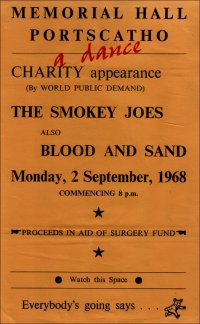
Final gig. A reunion in 1968 which didn't feature Gavin Carter
FOOTNOTES
By the way, Andrew, I know time has passed and water has gone under the bridge, but I was just wondering....
John Holdsworth sadly died of heart problems. He was a warm and generous person. He was like family.
John Sykes went on to play for Neat Change in London, then returned to Cornwall to play for White Lines.
Mick Grose became the original bass player for Queen in 1970. Their official website states that after three weeks "he quit Queen in search of a more reliable job". I understand he is not in the best of health and I wish him well.
Gavin Carter plays drums for Mr Beat and Delta Skelter.
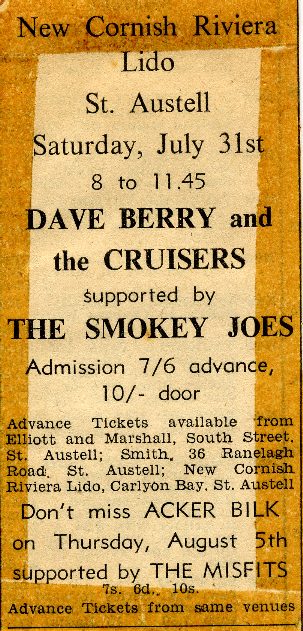 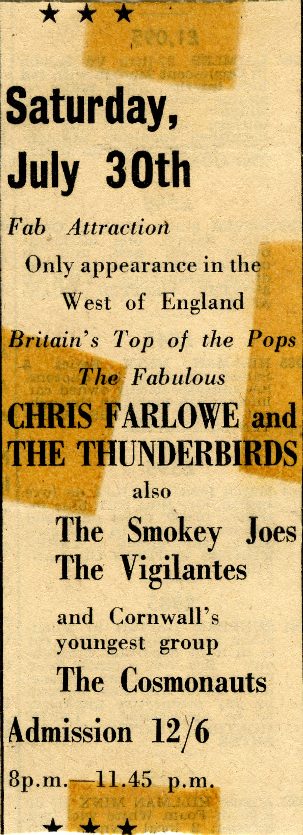 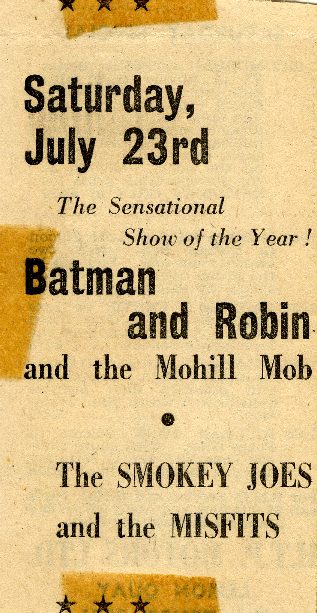 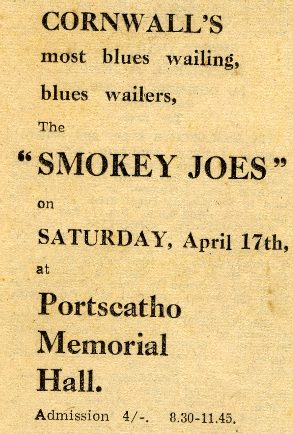 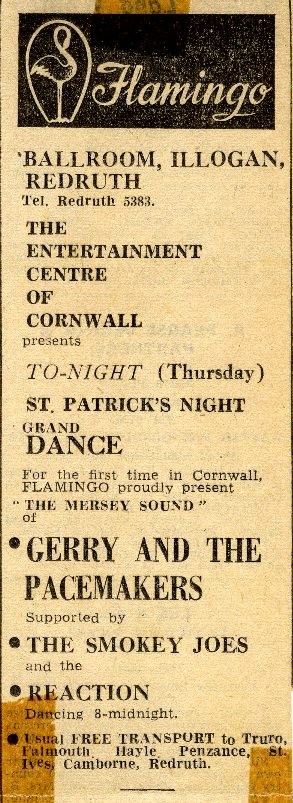
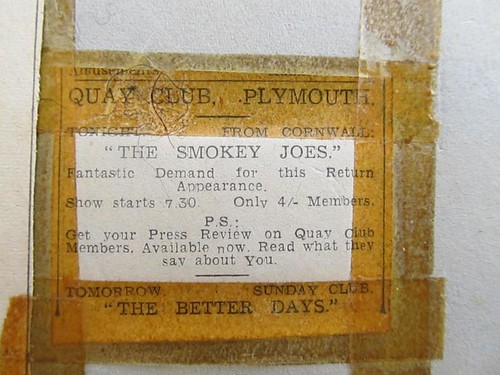
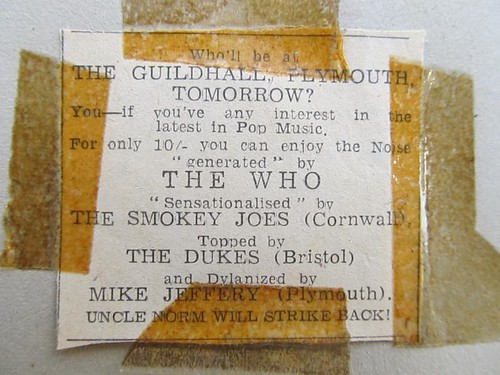
 
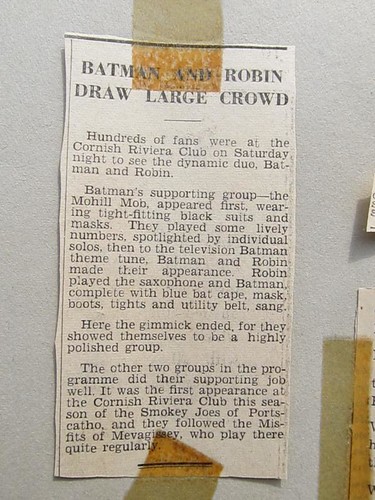
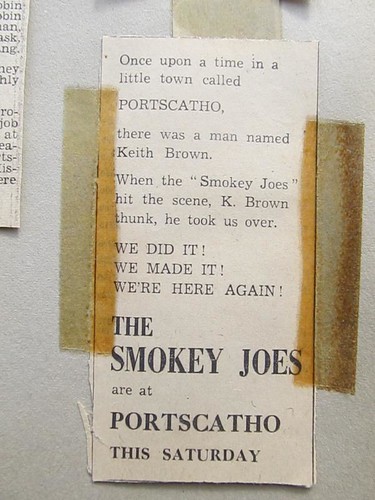
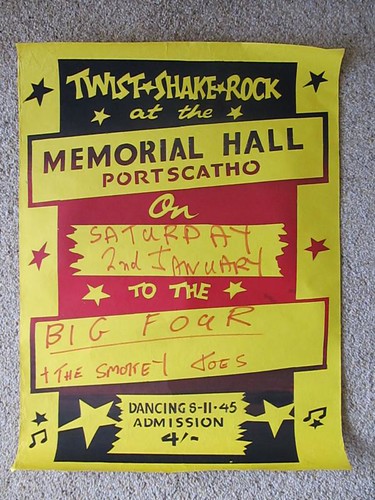
Very first gig
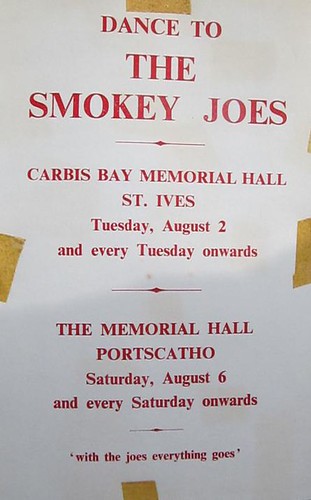
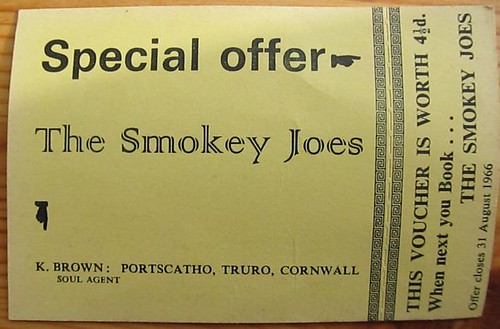
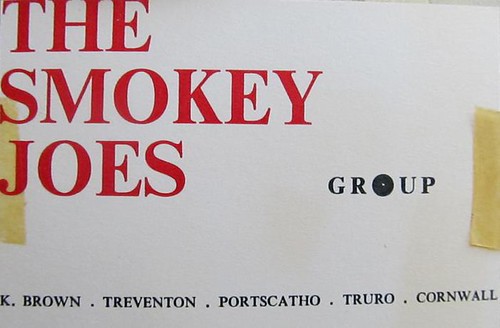
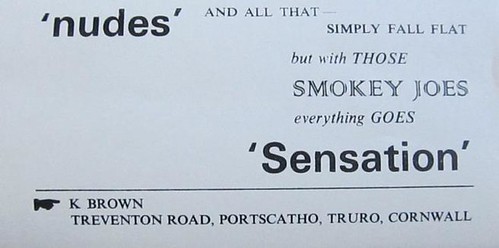
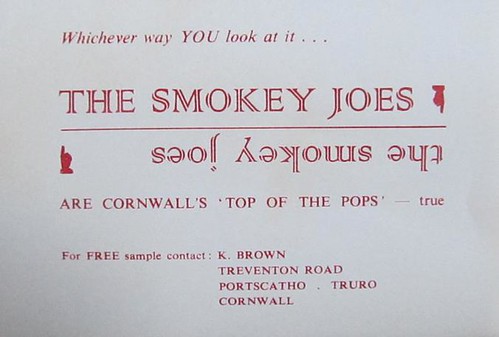
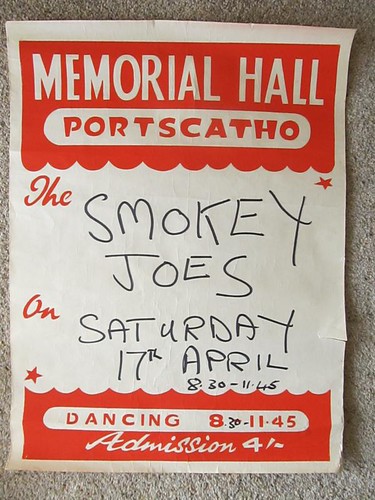
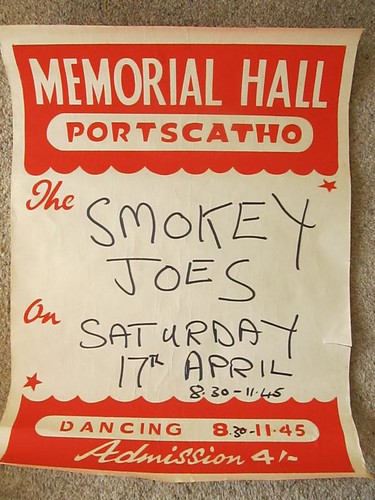
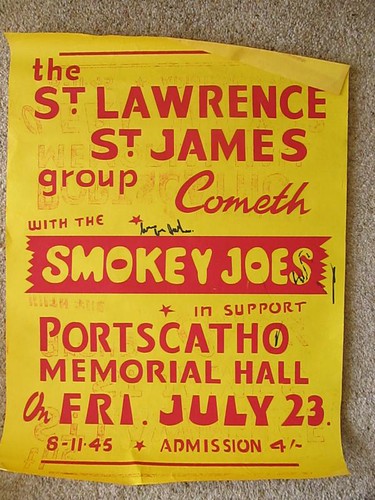
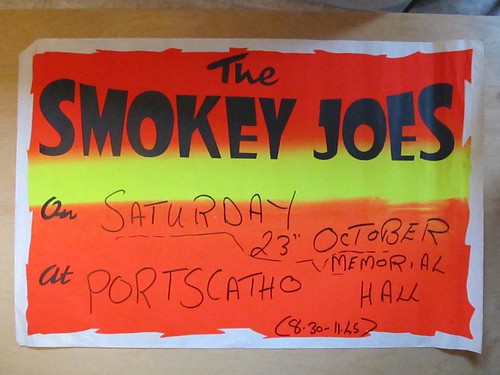
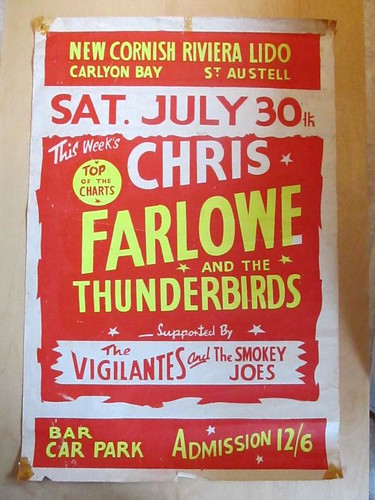
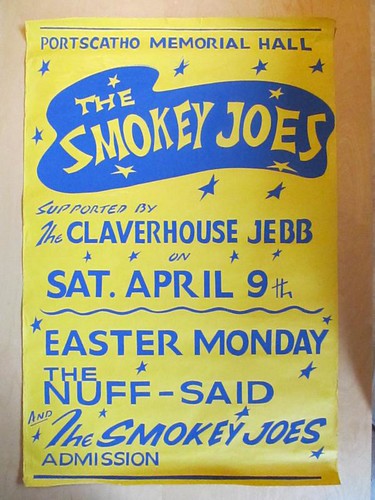
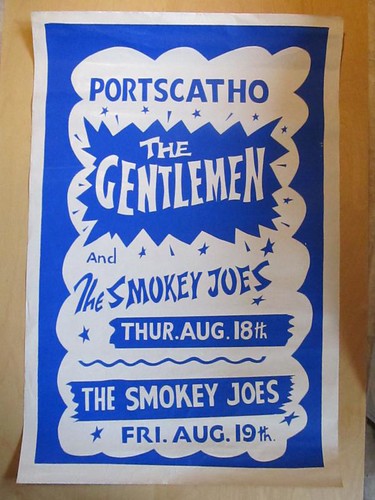
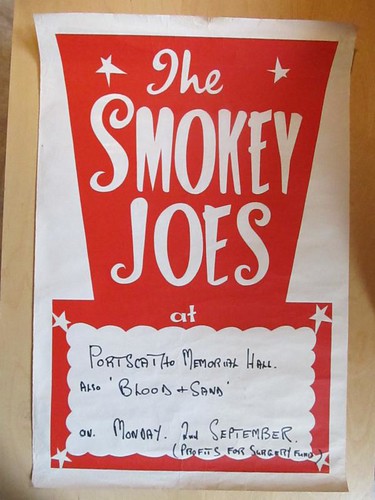
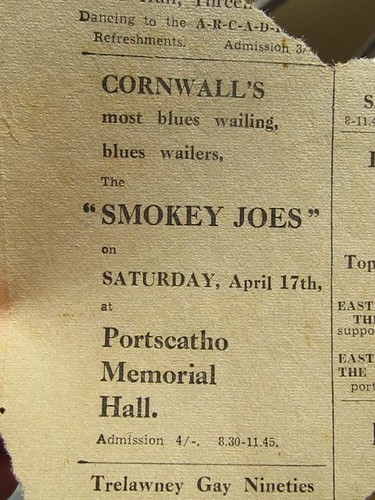
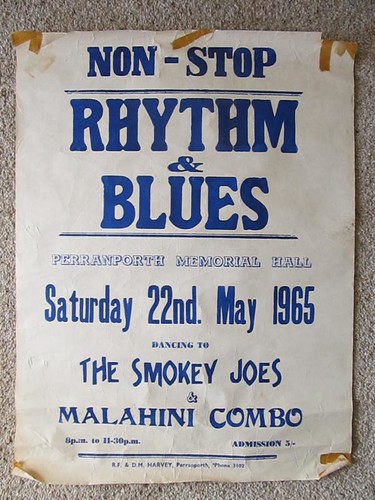
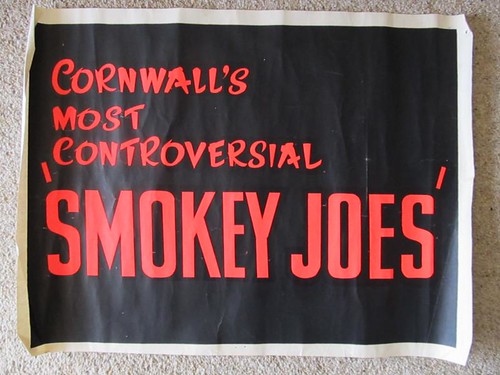
GIG LIST
DATE |
LOCATION |
SUPPORTING |
JOINT GIG |
SUPPORTED BY |
PLAYING TIME/
COMMENTS |
02/01/1965 |
Portscatho Memorial
Hall |
Big Four |
|
|
30 mins. First gig. |
15/01/1965 |
Portscatho Memorial
Hall |
|
|
|
30 mins |
06/02/1965 |
Portscatho Memorial
Hall |
|
Intruders |
|
Paid £6 |
12/02/1965 |
City Hall, Truro |
|
|
|
Truro Girls' School Dance |
27/02/1965 |
Portscatho Memorial
Hall |
Billy Black and
the Strangers |
|
|
|
12/03/1965 |
Church Hall,
St Austell |
|
|
|
First solo gig |
17/03/1965 |
Polgooth Institute |
|
|
|
3 hours. Paid £5 |
27/03/1965 |
Camborne School
of Mines |
|
|
|
Fancy dress function |
03/04/1965 |
Portscatho Memorial
Hall |
|
|
Illusions |
4 shillings to get in. First time supported. Paid £6 |
06/04/1965 |
Camborne Technical
College |
|
|
|
Hockey dance. 2.5 hours
Paid £10 |
17/04/1965 |
Portscatho Memorial
Hall |
|
|
|
40 numbers played |
19/04/1965 |
Perranporth |
|
Malahini Combo |
|
|
24/04/1965 |
Princess Pavilion,
Falmouth |
|
|
|
Paid £9. Solo gig. |
22/05/1965 |
Perranporth |
|
|
|
Paid £12. |
02/06/1965 |
Penzance Winter
Gardens |
|
|
|
John Adams. Paid £15 |
04/06/1965 |
Portscatho Memorial
Hall |
|
|
|
|
05/06/1965 |
Coliseum, Carlyon
Bay |
Them |
|
|
First time at Cornwall Coliseum.
Criticised by fan for playing "Gloria". |
12/06/1965 |
Perranporth |
|
|
|
3.5 hours. Paid £12 |
18/06/1965 |
Church Hall,
St Austell |
|
|
|
3 shillings and sixpence advertising costs |
25/06/1965 |
Veryan Legion Hall |
|
|
|
|
26/06/1965 |
Princess Pavilion.
Falmouth |
|
|
|
Two sets. Paid £9 |
03/07/1965 |
Coliseum, Carlyon
Bay |
|
Jaguars
Misfits |
|
|
10/07/1965 |
Portscatho Memorial
Hall |
|
|
|
|
23/07/1965 |
Portscatho Memorial
Hall |
|
|
Lawrence St James
Group |
1 hour |
24/07/1965 |
Perranporth |
Primitives |
|
|
75 mins |
31/07/1965 |
Coliseum, Carlyon
Bay |
Dave Berry and the
Cruisers |
|
|
2.75 hours |
04/08/1965 |
Winter Gardens,
Penzance |
|
|
|
3 hours |
13/08/1965 |
Portscatho Memorial
Hall |
|
|
|
|
14/08/1965 |
Barn Club,
Penzance |
|
|
|
|
21/08/1965 |
Portscatho Memorial
Hall |
|
|
|
|
30/08/1965 |
Portscatho Memorial
Hall |
|
|
|
|
02/09/1965 |
Skating Rink,
Camborne |
|
|
|
|
04/09/1965 |
Quay Club
Plymouth |
|
|
|
|
10/09/1965 |
Portscatho Memorial
Hall |
|
|
|
|
11/09/1965 |
Flamingo Ballroom,
Redruth |
|
|
|
First time at Flamingo.
2 hours. Paid £10. Lady at the entrance remarked "Whadee meen, there ain't no Binger 'ere tonite?" |
18/09/1965 |
Coliseum, Carlyon
Bay |
|
|
|
1.75 hours |
02/10/1965 |
Coliseum, Carlyon
Bay |
|
|
Dissatisfied (St Austell) |
(formerly Intruders) |
23/10/1965 |
Portscatho Memorial
Hall |
|
|
|
|
29/10/1965 |
St Brannoc's Hotel,
Newquay |
|
|
|
3.5 hours. Paid £13 |
03/11/1965 |
Annex, City Hall,
Truro |
|
|
|
3 hours. Paid £15 |
06/11/1965 |
Coliseum, Carlyon
Bay |
|
|
|
Paid £15 |
13/11/1965 |
Quay Club,
Plymouth |
|
|
|
|
20/11/1965 |
Perranporth |
|
|
|
|
04/12/1965 |
Quay Club,
Plymouth |
|
|
|
|
09/12/1965 |
Guild Hall,
Plymouth |
The Who |
|
|
Drummer was Viv Prince, not Keith Moon. Paid £25. |
24/12/1965 |
Ship and Castle,
St Mawes |
|
|
|
See text! 3 day gig reduced to
20 mins. Paid £25. |
27/12/1965 |
Flamingo Ballroom,
Redruth |
|
|
|
|
28/12/1965 |
Portscatho Memorial
Hall |
|
|
|
John Sykes quits the band, to be replaced by Mick Grose in due course |
25-27/02/1966 |
Westward Inn,
Lee Mill |
|
|
|
Resumption of band after unexpected pause. 3 day gig.
Slept in bus |
07/03/1966 |
City Hall, Truro |
|
|
|
Group Championship. The Reaction won. "If audience response was anything to go on, the Smokey Joes would have won." |
12/03/1966 |
Quay Club,
Plymouth |
|
|
|
|
17/03/1966 |
Flamingo Ballroom,
Redruth |
Gerry and the
Pacemakers |
|
Reaction |
|
19/03/1966 |
Portscatho Memorial
Hall |
|
|
|
|
02/04/1966 |
Modbury Memorial
Hall |
|
|
|
|
09/04/1966 |
Portscatho Memorial
Hall |
|
|
Claverhouse Jebb |
|
11/04/1966 |
Portscatho Memorial
Hall |
Nuff Said |
|
|
John Sykes's new band from London |
23/04/1966 |
Trerice Manor |
|
|
|
Gavin abroad. Stand in drummer Nigel Uren, plus guitarist Malcolm McKenna, both from the Bluecaps (later the Gentlemen) |
29/04/1966 |
Church Hall,
St Austell |
|
|
|
Charity gig arranged by Mrs Smith for mentally handicapped |
30/04/1966 |
Sidmouth |
|
|
|
Hotel accommodation. Got paid eventually from school. Good profit made for them |
07/05/1966 |
Modbury Memorial
Hall |
|
|
|
Paid £16. Crowd trouble. |
13/05/1966 |
Penmare Hotel,
Hayle |
|
|
|
|
21/05/1966 |
Wadebridge Town
Hall |
|
|
|
Bus for 29 cost £8 10s.
Paid £16 |
28/05/1966 |
Central Park Swimming Pool, Plymouth |
|
|
|
3 hours |
30/05/1966 |
Portscatho Memorial
Hall |
|
|
|
In excess of 175 paying customers on a Monday |
04/06/1966 |
Dobwalls |
|
|
|
BCD Entertainments. Peter Brown |
18/06/1966 |
Flamingo Ballroom, Redruth |
|
|
|
|
25/06/1966 |
Guild Hall,
St Ives |
|
|
|
Commando Club. Present was Andrew Lauder, head of A&R at the UK branch of Liberty Records, before going to United Artists. Offered recording contract.
Paid £17 |
08/07/1966 |
Church Hall,
St Austell |
|
|
|
3 hours. 63 Club. Offered £2 extra for every 100 people above 200 in the audience. |
09/07/1966 |
Portscatho Memorial
Hall |
|
|
|
|
23/07/1966 |
Coliseum, Carlyon
Bay |
Batman and Robin and
the Mohill Mob |
Misfits |
|
1.5 hours |
30/07/1966 |
Coliseum, Carlyon
Bay |
Chris Farlowe |
|
|
|
06/08/1966 |
Portscatho Memorial
Hall |
|
|
|
Took £35. Stamped people's hands on entry. |
13/08/1966 |
Portscatho Memorial
Hall |
|
|
|
Took £32. |
18/08/1966 |
Portscatho Memorial
Hall |
|
Gentlemen |
|
Took £25. |
19/08/1966 |
Portscatho Memorial
Hall |
|
|
|
Took £29. |
20/08/1966 |
Coliseum, Carlyon
Bay |
Billy J Kramer and
the Dakotas |
|
|
|
27/08/1966 |
Portscatho Memorial
Hall |
|
|
|
Last gig. 200+ paying customers in the audience.
Took £40. |
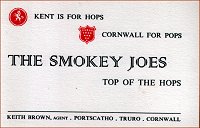
Chris Pollard has kindly shared his recollections of Smokey Joe’s
At the same time (as Chris was playing The Thubes) another band had been formed in Portscatho, and there is little doubt that this band would have a great deal of influence on us. The Smokey Joes were an R & B band full of raw power and we loved them. They were a little older than us so we looked up to them and more often than not, pinched the songs they had learned from old blues records. Julian and I would make our way to the Parish Hall on Saturday afternoons where they rehearsed, we would listen around the back of the hall memorising the words and the chords, then rush back to my place and learn them. It worked well. We learned a whole lot of songs and can remember them to this day.
The Smokey Joe's actually gave us (The Thubes) our first break, we were terrified. They often played at Portscatho Memorial Hall on a Saturday night, and agreed to let us play in the interval using their gear. We played four or five songs, and we really weren't bad ! That was probably our finest hour as they say! We repeated the exercise a few weeks later, only this time using our own gear, much of which we had made ourselves. Speaker cabinets etc. and it sounded, crap! Really no one could hear us. We retreated into my father's workshop in Gerrans and planned our future.
The Smokey Joe's were Rob Curtis, vocals and harmonica. Bill Harris on bass. John Sykes on electric piano. Gavin Carter on drums. And a guy known to me only as Dylan on guitar. The thing we loved about the Smokey's was their strong basic rhythm. This really came from Gavin who occasional played with maracas instead of drumsticks. When we have found it necessary though the years to try out drummers for our bands Julian and I have always measured their ability against Gavin's. "What do you think," "well he's not as good as Gavin" etc. However we got lucky in the end when we found Keith Marshall. The Smokey Joes also used a lot of harmonica, this gave the whole thing a very bluesy feel. It was the first time he had heard songs by Cyril Davis and Sonny Boy Williamson and we loved it. This band of R & B likely lads did really well in quite a short career, supporting headline bands such as The Who, The Primitives and Manfred Man. There's no doubt about it, we thought they were the business and we quite unashamedly stole many parts of their act. Well I suppose they had in a way stolen some of theirs from The Birds, who were also a great influence on us.
Even today you find us playing, LEAVING HERE, which was the Birds most successful record. I had no idea who The Birds were when they pulled up in their van with their name painted on the side, just opposite my parent's house. This must have been in 1964. The Birds were Ronnie Woods band from London and they had come down to play a gig at St. Austell. They had been booked by a Gerrans lad, Keith Brown. Keith was a promoter and manager of the Smokey Joe's, and was responsible for putting on many of the more important gigs in Cornwall at that time. Although he was never actually our manager, when the Smokey Joe's had ceased to exist, he took us under his wing and kept an eye on us when we were playing in The Seed.
When the Smokey Joe's retired from life on the road, keyboard player, John Sykes moved to London and played with The Mod Motown band, the Neat Change. They recorded one single for Decca called ‘I lied to Auntie May’, which was written by Andy Bown of 60's band The Herd and now of Status Quo. |
|

